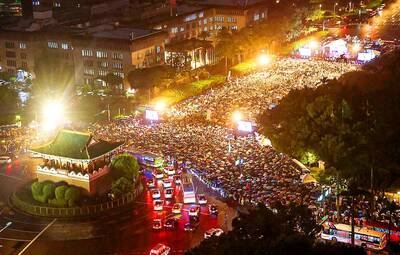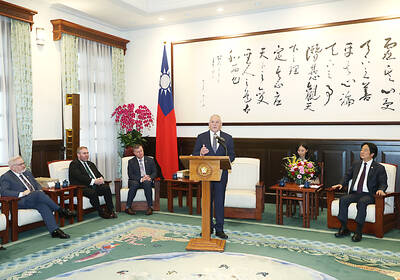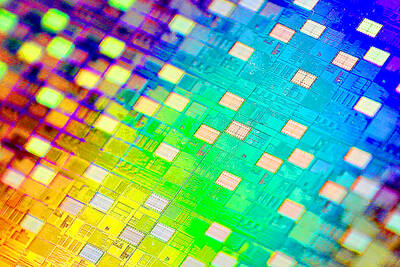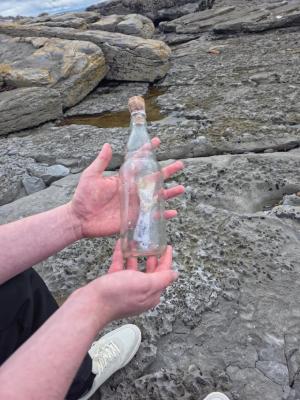The true test for the success of the Chinese Nationalist Party (KMT) government is two-fold: whether it can lift the country’s economy without resorting to corruption, and whether China will make concessions in response to increased cross-strait exchanges, said Graham Watson, the leader of the Alliance of Liberals and Democrats for Europe in the European Parliament, in an interview with the Taipei Times on Tuesday.
Watson came to Taipei with an eight-person delegation from the parliament’s liberal group.
While the Democratic Progressive Party (DPP) tried to establish more freedom and independence, the KMT wants to achieve the same thing through better relations with China, he said.
“I don’t know who’s right, we will see, but if the cross-strait policy of the current government is working well, then it will soon lead to meaningful participation for Taiwan in bodies such as the WHO because there should be some movement on the side of the PRC [People’s Republic of China], it should not only be movements on the Taiwan side,” he said.
“The tests would be fundamentally two things: One, can [the KMT] manage the economy properly without corruption coming back in, as was the case when they were last in power, and second, will their policy of closer relationships across the Strait lead to concessions by China towards Taiwan?” he said.
Watson said he had visited Taiwan at least eight times and “the reason for doing this is to show members of the European Parliament how impressive Taiwan’s achievements are, not only economically but also in terms of social development, [such as] the development of democracy since the lifting of martial law 21 years ago.”
Saying that he earlier had a good meeting with President Ma Ying-jeou (馬英九), Watson said Ma was “clearly a new-style Chinese Nationalist Party” member who is a good communicator and will represent Taiwan well to the outside world.
“[However,] in politics the test for all of us is how much we can convince our own people, and that will be his job for the next four years,” Watson said.
“[The improvement of relations between KMT and China] is a remarkable development,” Watson said. “President Ma stressed to us during our meeting that there would be no reunification — he also said no independence of course — [and] we must give the new government the chance to prove themselves.”
Watson also discussed Taiwan’s participation in international forums.
“It is our view that you cannot exclude a country as important as Taiwan from meaningful participation in things like world health talks … It makes sense that Taiwan should be involved in the WHO and I hope that the improvement in cross-strait relations will help achieve that.”
As for his thoughts on the opening of direct cross-strait flights across the Strait, Watson said: “Taiwan is already [economically] dependent on China — with US$60 billion worth of investment there. A good long-term strategy for Taiwan would be to diversify investments [from China] to other countries.”
Watson suggested Taiwan also needed to invest more in education so that it can better manage the transition from a manufacturing economy to a service economy.
Asked his views on reports of policemen reportedly trying to snatch national flags from civilians during the recent visit of a Chinese envoy, as well as the ensuing Wild Strawberry demonstration, Watson said in a democracy there has to be freedom for demonstrations.
“It’s very difficult for me to judge [the status of human rights] from outside the country, but I think everybody would recognize that Taiwan is much freer than most countries in Asia,” he said. “[As is the case with other democratic counties,] students are often in the vanguard of movements for civil freedom, [and] you have a vibrant democracy here.”
“If governments do not respond to public concern, in the end they are voted out of office. And that must be [Ma’s] choice how far he responds,” he said.
Watson said the delegation also talked with local politicians about opening up of government procurement policy to European countries, the issue of death penalty and the issue of visa waiver.

FINAL COUNTDOWN: About 50,000 attended a pro-recall rally yesterday, while the KMT and the TPP plan to rally against the recall votes today Democracy activists, together with arts and education representatives, yesterday organized a motorcade, while thousands gathered on Ketagalan Boulevard in Taipei in the evening in support of tomorrow’s recall votes. Recall votes for 24 Chinese Nationalist Party (KMT) lawmakers and suspended Hsinchu City mayor Ann Kao (高虹安) are to be held tomorrow, while recall votes for seven other KMT lawmakers are scheduled for Aug. 23. The afternoon motorcade was led by the Spring Breeze Culture and Arts Foundation, the Tyzen Hsiao Foundation and the Friends of Lee Teng-hui Association, and was joined by delegates from the Taiwan Statebuilding Party and the Taiwan Solidarity

‘NON-RED’: Taiwan and Ireland should work together to foster a values-driven, democratic economic system, leveraging their complementary industries, Lai said President William Lai (賴清德) yesterday expressed hopes for closer ties between Taiwan and Ireland, and that both countries could collaborate to create a values-driven, democracy-centered economic system. He made the remarks while meeting with an Irish cross-party parliamentary delegation visiting Taiwan. The delegation, led by John McGuinness, deputy speaker of the Irish house of representatives, known as the Dail, includes Irish lawmakers Malcolm Byrne, Barry Ward, Ken O’Flynn and Teresa Costello. McGuinness, who chairs the Ireland-Taiwan Parliamentary Friendship Association, is a friend of Taiwan, and under his leadership, the association’s influence has grown over the past few years, Lai said. Ireland is

Instead of threatening tariffs on Taiwan-made chips, the US should try to reinforce cooperation with Taiwan on semiconductor development to take on challenges from the People’s Republic of China (PRC), a Taiwanese think tank said. The administration of US President Donald Trump has threatened to impose across-the-board import duties of 32 percent on Taiwan-made goods and levy a separate tariff on semiconductors, which Taiwan is hoping to avoid. The Research Institute for Democracy, Society, and Emerging Technology (DSET), a National Science and Technology Council think tank, said that US efforts should focus on containing China’s semiconductor rise rather than impairing Taiwan. “Without

An SOS message in a bottle has been found in Ireland that is believed to have come from the Taiwanese captain of fishing vessel Yong Yu Sing No. 18 (永裕興18號), who has been missing without a trace for over four years, along with nine Indonesian crew members. The vessel, registered to Suao (蘇澳), went missing near Hawaii on Dec. 30, 2020. The ship has since been recovered, but the 10 crew members have never been found. The captain, surnamed Lee (李), is believed to have signed the note with his name. A post appeared on Reddit on Tuesday after a man